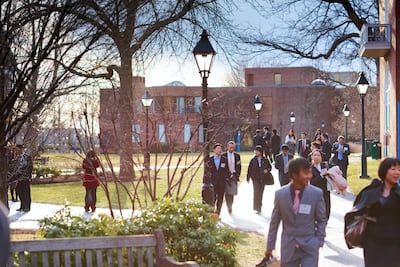Six of Harvard's schools will switch to online-only classes in the next academic year, as the university joined a growing list of higher education institutions that will keep students off campus until at least 2021.
The University of Cambridge has also confirmed that all “face-to-face lectures” will be held remotely during the next academic year.
Top international universities are changing their mode of teaching amid the coronavirus pandemic, with some colleges planning for online-only classes for the fall semester.
Online learning arrangements that kicked in at the beginning of the year as campuses closed to limit the spread of Covid-19 may continue through the next academic year in some cases.
At the same time, several top colleges in the world are opting for a hybrid mode of teaching, which will include a mix of online and physical classroom learning.
Many universities are still assessing the situation before announcing a final decision.
The UAE Ministry of Education has kept the options open, maintaining that distance learning for students across universities could be extended to the next academic year.
The ministry has clarified that any decision on the academic year 2020/2021 “is still under review” and will be taken “based on the health situation and precautionary measures”, according to state news agency Wam
The number of international students has increased globally and reached 5.3 million in 2017, up from two million in 2000, according to The United Nations Educational, Scientific and Cultural Organisation.
Peter Davos, managing director of Hale Education Group, an education consultancy in Dubai, said universities will have to be more flexible to attract students but the coronavirus would not decrease the appetite for foreign education.

He said the coronavirus had pushed pupils to explore diversified options and include online programmes on their lists.
“We are seeing more interest in online options and in options closer to home. Students have raised their concerns and are applying to additional programmes, some of which are online,” said Mr Davos.
“We are not shifting entirely to an online model. I think it is a short-term consideration but not a long-term prospect.”
The National brings to you a list of universities that will give instructions almost exclusively online and ones that will have a mix of real and virtual lessons for students.
Harvard: online only
As of June 3, six of Harvard's 12 degree schools have confirmed that they will continue with online classes this fall semester.
Harvard Law School, Harvard Kennedy School, Harvard School of Public Health, Harvard Graduate School of Design, and Harvard Divinity School will hold online-only classes in the coming term.
Harvard Graduate School of Education will go ahead with online lessons for the 2020-2021 academic year.
The university will continue with "remote teaching, learning, working, and research. [It] will resume science lab operations with stringent requirements," according to Harvard's website.
Cambridge: online only
The University of Cambridge has confirmed that all "face-to-face lectures" will be held remotely during the next academic year.
“The University is constantly adapting to changing advice as it emerges during this pandemic,” said a spokesman for the university.
“Given that it is likely that social distancing will continue to be required, the university has decided there will be no face-to-face lectures during the next academic year.”
Stanford: face-to-face classes
Stanford’s main campus is located in Santa Clara County, which was one of the nation’s early hot spots for Covid-19.
However, it has announced plans for returning students and faculty to its campus by mid-September.
The university said it plans to resume in-person classes and will start the fall quarter one week early, on September 14, and end classes by Friday, November 20, though its business, education, law and medical schools may adopt their own calendars.
For its undergraduate programmes, it will draw a quarterly plan where half of the students will be on campus for the fall quarter and each subsequent quarters.

Boston University: hybrid classes
Undergraduate students at the university will have the option of taking in-person or online classes this fall semester, the university said this week.
Learn from Anywhere (LFA), is the new hybrid teaching format that is going to be introduced.
“The LFA format lets students decide how to take classes, based on their needs and their comfort level,” president Robert Brown said on the university’s website.
“BU students now have the option to either be in the classroom in person or to participate remotely from their dorm room or off-campus home, and they can exercise that remote option at any time during the semester. LFA also enables the university to provide the necessary social distancing in classrooms, studios, and laboratory spaces.”
"Return to a residential campus operation is our goal; all efforts to that end are being made deliberately and in consultation with the Medical Advisory Group established by the university. We will provide further details as this phased transition progresses," a university spokesman said.
Oxford: hybrid classes
Oxford University plans to hold a mix of online and face-to-face classes.
“For undergraduate and taught graduate courses, the emphasis on small-group teaching by leading academics [for example, in undergraduate tutorials] is fundamental to an Oxford education and will continue to be a central part of our offering in the 2020/21 academic year,” according to the university website.
“Face-to-face teaching and research supervision will be complemented by high quality online activities where necessary.
“Arrangements for teaching and/or research will, of course, be subject to conditions prevailing at the time and always with the health and safety of students and staff as the first priority”.
University of Pennsylvania: hybrid classes
University of Pennsylvania is planning a likely combination of in-class and virtual teaching (particularly for large lectures) depending on the circumstances.
The university has formed a Recovery Planning Group that is examining the elements that would be required to allow a safe return to more normal campus operations, such as testing, contact tracing, isolation of Covid-19 positive people, and optimising the capacity to provide separate bedroom for students.
Massachusetts Institute of Technology: undecided
MIT has not made any announcement yet about the coming fall semester, with a decision expected in late June or early July.
“However, the situation is still changing very rapidly,” according to the MIT website.
“While we’re learning more about Covid-19 every day, MIT’s leaders believe the right and responsible thing to do is to wait until the last possible moment to make that decision – so that our decision is informed by the best possible understanding of the progression of Covid-19, and of how to stop its spread.”
A more hybrid mix of classes could be rolled out for students.
“We anticipate that all classes will need to have an online option, to accommodate both students and instructors who may be at heightened risk from Covid-19.”
Yale: undecided
Yale is still undecided if it will go ahead with online, residential or hybrid lessons for the fall semester.
An announcement is expected in early July following guidelines from state and medical authorities.
In a residential scenario, it is likely that there will be no breaks for Labour Day or October recess, and it will end by November 20, before the Thanksgiving week.
“Academic commitments after Thanksgiving will be online, and the campus will close to undergraduates," said Marvin M. Chun Dean of Yale College.
"Depending on the global health situation, emergency accommodation may be considered for students who may not be able to travel home at that time, as in this past spring.”












